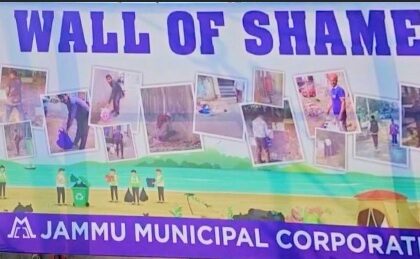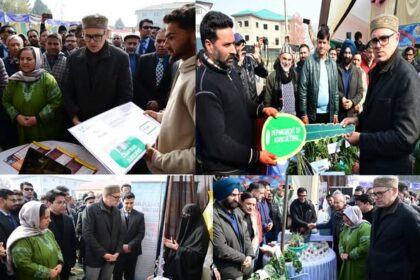The Election Commission mandates SSR in J&K, with the final electoral rolls to be released on August 20.
||Black and White Digital News ||
||Parvinder Singh June 22,2024 ||
JAMMU: In a landmark development, the Election Commission of India (ECI) has initiated the process for the first-ever Legislative Assembly elections in the Union Territory of Jammu and Kashmir, marking a significant step towards restoring democratic governance in the region. This move comes along with preparations for elections in Maharashtra, Jharkhand, and Haryana, all scheduled for later this year.
Key Details of the Election Process…
1. Summary Revision of Electoral Rolls:
The ECI has ordered a second Special Summary Revision of photo electoral rolls in Jammu and Kashmir, alongside Maharashtra, Jharkhand, and Haryana. This revision aims to ensure an accurate and up-to-date voter list ahead of the elections.
2. Publication Schedule:
Pre-Revision Activities: June 25 – July 24
Integrated Draft: Electoral Rolls: July 25
Claims and Objections: July 25 – August 9
Disposal of Claims and Objections: August 19
Final Electoral Rolls: August 20, coinciding with the end of the annual Amarnath Yatra.
3.Supreme Court Directive:
Following the Supreme Court’s verdict on December 11, 2023, which upheld the abrogation of Article 370, the ECI was directed to hold the Assembly elections in Jammu and Kashmir by September 30, 2024.
4. Qualifying Date for Voter Rolls:
The voter list will be updated with July 1, 2024, as the qualifying date, replacing the previous January 1 date used for the Lok Sabha polls.
Political and Historical Context…
Transition to Union Territory:
Jammu and Kashmir was reorganized as a Union Territory on August 5, 2019, after the abrogation of its special status under Article 370. Since then, the region has been under direct federal control, and no elections have been held for its 90-member Legislative Assembly.
Delimitation and Representation:
The Assembly consists of 90 seats, with 47 in the Kashmir division and 43 in the Jammu division. Additionally, five seats are nominated for representatives including women, Kashmiri migrants, and a PoJK refugee. Notably, 24 seats are reserved for areas in Pakistan-occupied Jammu Kashmir (PoJK), currently under Pakistan’s control.
Statements and Implications…
Prime Minister’s Assurance:Prime Minister Narendra Modi, during his recent visit to Srinagar, affirmed that Assembly elections would be conducted soon, with plans to restore statehood to Jammu and Kashmir in the future. This statement highlights the government’s commitment to re-establishing democratic processes in the region.
Chief Election Commissioner’s Remarks:
Chief Election Commissioner Rajiv Kumar has expressed optimism, stating that the poll panel will initiate the Assembly election process “very soon,” following the robust voter turnout in the recent Lok Sabha polls in the region.
Procedural Aspects
Symbols Allocation for Parties:In anticipation of the elections, the ECI announced on June 7 that registered unrecognized parties in Jammu and Kashmir can apply for common symbols. This provision, under Para 10 B of the Election Symbols (Reservation & Allotment) Order, 1968, allows these parties to request a common symbol up to six months before the term of the House ends.
Future Outlook
As the election preparations gain momentum, the publication of the final electoral rolls on August 20 will mark a crucial milestone. The elections are expected to bring a renewed sense of representation and political participation to the people of Jammu and Kashmir, setting the stage for a new chapter in the region’s governance. The successful conduct of these elections will be a testament to India’s democratic resilience and commitment to upholding the constitutional rights of its citizens.
The upcoming Legislative Assembly elections in Jammu and Kashmir are more than just a political event; they symbolize a return to normalcy and democratic engagement for a region that has undergone significant changes in recent years. With meticulous planning and adherence to legal directives, the Election Commission is poised to facilitate a transparent and inclusive electoral process, paving the way for the people of Jammu and Kashmir to elect their representatives and shape their future.
Leave a comment
You Might Also Like
जम्मू–कश्मीर में जम्मू नगर निगम की सख़्त और सराहनीय पहल — “WALL OF SHAME”
जम्मू–कश्मीर में जम्मू नगर निगम की सख़्त और सराहनीय पहल — “WALL OF SHAME” https://www.facebook.com/share/v/1Boa44gcjo/ शहर को स्वच्छ रखने के…
2 Min Read
DIPR Jammu & Kashmir is participating in the 56th International Film Festival of India, Goa 2025.
DIPR Jammu & Kashmir is participating in the 56th International Film Festival of India, Goa 2025. A dedicated J&K Pavilion…
0 Min Read
Chief Minister Omar Abdullah inaugurated a two-day J&K Business & Trade Fair in Kulgam, emphasising entrepreneurship as the key driver of the UT’s future growth.
Chief Minister Omar Abdullah inaugurated a two-day J&K Business & Trade Fair in Kulgam, emphasising entrepreneurship as the key driver…
0 Min Read
A delegation of the Shri Lakshmi Narayan Temple Management Trust, Gandhi Nagar Jammu, led by President V.K. Abrol, called on Lieutenant Governor Manoj Sinha in Jammu today.
A delegation of the Shri Lakshmi Narayan Temple Management Trust, Gandhi Nagar Jammu, led by President V.K. Abrol, called on…
0 Min Read









